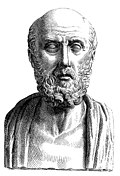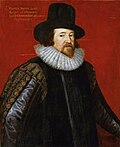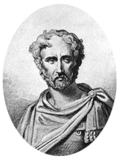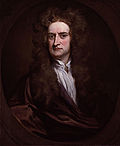Portal:History of science
The History of Science Portal
The history of science covers the development of science from ancient times to the present. It encompasses all three major branches of science: natural, social, and formal. Protoscience, early sciences, and natural philosophies such as alchemy and astrology that existed during the Bronze Age, Iron Age, classical antiquity and the Middle Ages, declined during the early modern period after the establishment of formal disciplines of science in the Age of Enlightenment.
Science's earliest roots can be traced to Ancient Egypt and Mesopotamia around 3000 to 1200 BCE. These civilizations' contributions to mathematics, astronomy, and medicine influenced later Greek natural philosophy of classical antiquity, wherein formal attempts were made to provide explanations of events in the physical world based on natural causes. After the fall of the Western Roman Empire, knowledge of Greek conceptions of the world deteriorated in Latin-speaking Western Europe during the early centuries (400 to 1000 CE) of the Middle Ages, but continued to thrive in the Greek-speaking Byzantine Empire. Aided by translations of Greek texts, the Hellenistic worldview was preserved and absorbed into the Arabic-speaking Muslim world during the Islamic Golden Age. The recovery and assimilation of Greek works and Islamic inquiries into Western Europe from the 10th to 13th century revived the learning of natural philosophy in the West. Traditions of early science were also developed in ancient India and separately in ancient China, the Chinese model having influenced Vietnam, Korea and Japan before Western exploration. Among the Pre-Columbian peoples of Mesoamerica, the Zapotec civilization established their first known traditions of astronomy and mathematics for producing calendars, followed by other civilizations such as the Maya.
Natural philosophy was transformed during the Scientific Revolution in 16th- to 17th-century Europe, as new ideas and discoveries departed from previous Greek conceptions and traditions. The New Science that emerged was more mechanistic in its worldview, more integrated with mathematics, and more reliable and open as its knowledge was based on a newly defined scientific method. More "revolutions" in subsequent centuries soon followed. The chemical revolution of the 18th century, for instance, introduced new quantitative methods and measurements for chemistry. In the 19th century, new perspectives regarding the conservation of energy, age of Earth, and evolution came into focus. And in the 20th century, new discoveries in genetics and physics laid the foundations for new sub disciplines such as molecular biology and particle physics. Moreover, industrial and military concerns as well as the increasing complexity of new research endeavors ushered in the era of "big science," particularly after World War II. (Full article...)
Selected article -
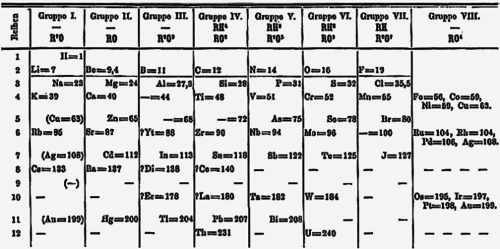
and making alloys like bronze.
The protoscience of chemistry, and alchemy, was unsuccessful in explaining the nature of matter and its transformations. However, by performing experiments and recording the results, alchemists set the stage for modern chemistry. (Full article...)
Selected image
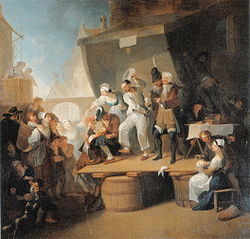
Der Quacksalber (The Quack) is a painting (oil on wood, 53 x 56 cm) by Franz Anton Maulbertsch, from some time before 1785. The subject, of course, is quackery—the peddling of unproven, and sometimes dangerous, medicines, cures or treatments— which has existed throughout the history of medicine. In ancient times, theatrics were sometimes mixed with actual medicine to provide entertainment as much as healing. Quack medicines often had little in the way of active ingredients, or had ingredients which made a person feel good, such as what came to be known as recreational drugs. Morphine and related chemicals were especially common, being legal and unregulated in most places at the time. Arsenic and other poisons were also included.
Did you know
...that Einstein's famous letter to FDR about the possibility of an atomic bomb was actually written by Leó Szilárd?
...that geology was transformed in the latter part of the 20th century after widespread acceptance of plate tectonics?
...that the idea of biological evolution dates to the ancient world?
Selected Biography -
Clarisse Doris Hellman Pepper (August 28, 1910 – March 28, 1973) was an American historian of science, "one of the first professional historians of science in the United States". She specialized in 16th- and 17th-century astronomy, wrote a book on the Great Comet of 1577, and was the translator of another book, a biography of Johannes Kepler. She became a professor at the Pratt Institute and later at the Queens College, City University of New York, and was recognized by membership in several selective academic societies. (Full article...)
Selected anniversaries
- 1566 - Death of Luca Ghini, Italian physician and botanist (b. 1490)
- 1677 - Death of Isaac Barrow, English mathematician (b. 1630)
- 1733 - Birth of Jean-Charles de Borda, French mathematician, physicist, political scientist, and sailor (d. 1799)
- 1808 - The Royal Netherlands Academy of Arts and Sciences is founded by Louis Bonaparte.
- 1825 - Birth of Thomas Henry Huxley, English biologist (d. 1895)
- 1972 - The Don't Make A Wave Committee, a fledgling environmental organization founded in Canada in 1971, officially changed its name to "Greenpeace Foundation."
- 1972 - Death of Edward Calvin Kendall, American chemist and Nobel Prize laureate (b. 1886)
Related portals
Topics
General images
Subcategories
Things you can do
Help out by participating in the History of Science Wikiproject (which also coordinates the histories of medicine, technology and philosophy of science) or join the discussion.
Associated Wikimedia
The following Wikimedia Foundation sister projects provide more on this subject:
-
Commons
Free media repository -
Wikibooks
Free textbooks and manuals -
Wikidata
Free knowledge base -
Wikinews
Free-content news -
Wikiquote
Collection of quotations -
Wikisource
Free-content library -
Wikiversity
Free learning tools -
Wiktionary
Dictionary and thesaurus



